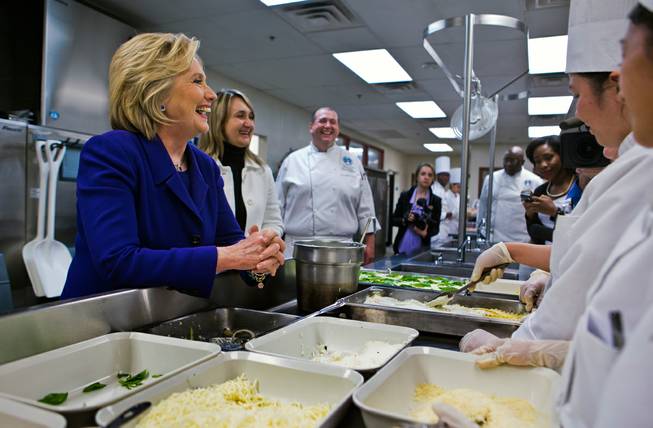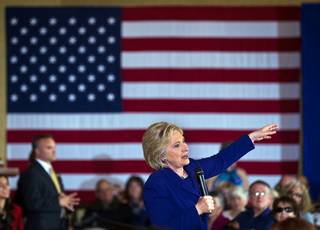
Democratic presidential hopeful Hillary Clinton talks with young cooks as they prepare lasagna at Culinary Academy of Las Vegas on Wednesday, Jan. 6, 2016.
Thursday, Jan. 7, 2016 | 2 a.m.
Before speaking at the Battle Born/Battleground First in the West Caucus Dinner hosted by Senate Minority Leader Harry Reid at the MGM Grand on Wednesday, Democratic presidential front-runner Hillary Clinton swung through the valley, making campaign stops at Sun City Anthem and the Culinary Academy of Las Vegas.
Between events, the former secretary of state and U.S. senator sat down with the Sun for an exclusive interview, talking about the issues that matter most to Nevadans, including the collapse of the state’s solar industry, a hike in the minimum wage, the standoff between federal agents and the sons of rancher Cliven Bundy in Oregon and whether — once and for all — a nuclear waste depository at Yucca Mountain would be off the table.
This conversation has been edited for length and clarity.
Las Vegas Sun: You’ve been a supporter of clean energy and, more specifically, solar power. Our Public Utilities Commission dealt a significant blow to the state’s solar future just before Christmas. What are you going to do as president to ensure the future of the solar industry?
Clinton: I know there will be a hearing about this decision in the next few days. I think it's important we give investors certainty and we give consumers choice. We're never going to transition to clean renewable energy if we don't do that.
Just look at the jobs that are being created. Nationwide, 174,000 jobs in the last few years. Here in Nevada, 5,900 jobs — 3,900 just last year. This is a win-win to move us away from fossil fuels, to diversify the grid, to give homeowners a chance to be empowered to do something about their own energy usage and put people to work.
I hope there is a way that this state can figure out a path forward. Every state is somewhat different. Every state has different rules and regulations and investment climates, but I'm absolutely convinced we're going to have to do more solar, more wind and more renewables if we're going to have the kind of future we should.
I don't know all of the public utility rules in Nevada, but certainly people who acted in good faith should be given the benefit of that moving forward. I don't think any change in rules should penalize people who were permitted and encouraged to do what folks have done. They shouldn't see that investment absolutely destroyed. I'm hoping that there can be a sensible recognition of the benefits that this provides and the investments that people have already made.
Cattle rancher Cliven Bundy led an armed standoff with law enforcement nearby in Bunkerville in 2014. Now his sons are leading an armed occupation of a federal building in Oregon. How would you, as president, respond to those incidents?
Well, every incident where people are violating the law and potentially posing a threat to law enforcement and civilians has to be approached very carefully. I think that the federal and local law enforcement officials are very carefully trying to manage this so it doesn't result in bloodshed.
I understand that the occupiers of the federal land have said that they will leave if the local community doesn't want them, and from what I'm seeing in the news, the local community doesn't want them. They should leave — leave peacefully — but they should be charged for the illegal action they have undertaken, trespassing, breaking and entering and the like.
It's always best if we can resolve any kind of situation like this in a peaceful way, but people have to also be put on notice that the law has to be obeyed.
In November, voters may have a chance to weigh in on whether to raise Nevada’s minimum wage from $8.25 an hour to $13 over the next decade. Unions here and across the country would like to see more — $15 an hour wage. You support a $12 an hour wage. Talk about the distance between all those proposals. How do you close it?
I think that the federal minimum wage sets a floor and above that cities and states can go higher, and some already have. As you know, we have a $15 (an hour) minimum wage in Los Angeles and in Seattle and New York City for fast food workers.
I applaud the people of Nevada for putting this on a statewide ballot. I would hope they would pass it because it's important that we raise the minimum wage, and some states are already higher than the federal minimum wage. Others unfortunately are not. So that's why we need to operate both at the federal level to raise the minimum wage.
I have been guided by experts in this area who've done an enormous amount of research here and around the world, and who are very supportive of a $12 minimum. But, at the same time, I have advocated and supported a higher minimum in many parts of the country, and this would be a perfect example where I think that would be called for.
In 2008 you said, "When I am president, Yucca Mountain will be off the table forever." This year, you added that “we do need to figure out what we’re going to do with nuclear waste.” So, what do we do with it?
Yucca should be off the table because I think there are enough questions about its suitability as a site, and there is also such organized opposition to its use that it doesn't really make sense.
But there should be a continuing science-based effort to try to figure out what to do about nuclear waste, and I'm open to talking with experts who have been studying this and listening to local communities about what their preferences might be. But I would keep Yucca Mountain off the table.
Almost half of all undocumented immigrants in Clark County would qualify for deportation relief through President Barack Obama’s deferral program. That program is still tied up in the courts, and Obama has faced intense Republican opposition in his efforts to push forward comprehensive immigration reform. What are you going to do differently?
I think that the general election will pose that question very pointedly for the electorate. Some of the Republicans who talk about rounding up and deporting 11 or 12 million people have no intention of following through.
It would be a terrible upheaval across America. It would cost hundreds of billions of dollars. It would be in violation of our values. It would just be the most divisive kind of disruption to our workforce, to families and it's not going to happen.
Since it's not going to happen, what is it that we're going to do? And that's where I say we need comprehensive immigration reform. If we take back the Senate, which I certainly hope we do in this next election so it's once again Democratically run, if we demonstrate in the presidential election that the Republicans ignore the Latino vote at their peril, that their demonizing of immigrants is going to cost them in the ballot box, I think we can begin to move toward some political resolution.
I strongly favor comprehensive reform with a path to citizenship, and that's what I would stand up for and fight for as president.
The Nevada delegation has been pushing hard for an extension of I-11 to connect Phoenix, Las Vegas and Reno. Sen. Dean Heller won funding for it in the latest five-year transportation bill. Simultaneously, we’re looking at high-speed rail between L.A. and Vegas, as well as a test bed for Hyperloop. Let’s talk about interstate transportation. Is it smart to keep funneling money for extensions of the Eisenhower-era highway system — or, especially given climate change, is it time to transition?
That's a great question. I think we have to do both. There are some areas of the country that need new highways as well as modernization and repair and upkeep. But we should be thinking and investing in the transportation modalities of the future.
I am a strong supporter of high-speed rail, especially between destinations between L.A. and Las Vegas where you have an enormous amount of travel and where it'll be convenient for tourists and regular visitors as well as commuters. I think a lot of the new technologies that are being pioneered in places like Japan we should look at here in America.
There are places in our country that need continuing investment in the interstate highway system and we certainly can't let our big investment in all the highways we already have deteriorate. We have to do something about our bridges, which are in terrible shape. A lot of our tunnels are really in need of repair. But we should be investing in the future as well. And I think Nevada is, as you say, a great test case of that.
Over the past few weeks, the Review-Journal has been in tumult since it was purchased by the family of Sheldon Adelson. Does this all but doom your hopes of an endorsement?
[Laughs.] Oh well, you know, hope springs eternal. Perhaps people will see the light about what's best for America.


Join the Discussion:
Check this out for a full explanation of our conversion to the LiveFyre commenting system and instructions on how to sign up for an account.
Full comments policy